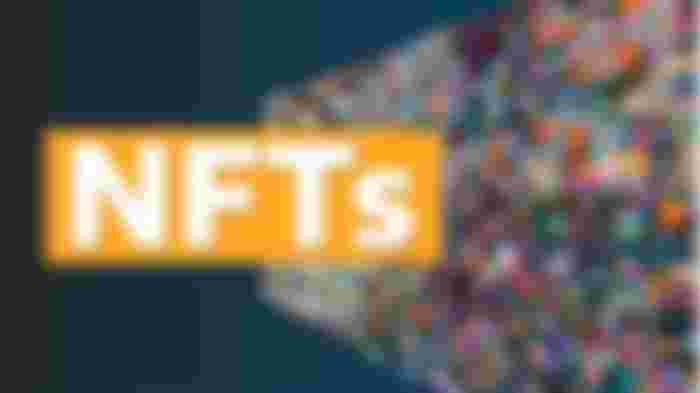NFT ( Non Fungible Token)
Today I am going to write an article on topic NFT. Nowadays NFT played a vital role in cryptocurrency. I hope you will take benefit from my this article.
Introduction
Non-fungible tokens (NFTs) are the latest craze in the world of blockchain technology. These digital assets are unique and cannot be exchanged for other tokens or currencies on a one-to-one basis like traditional cryptocurrencies. NFTs are used to represent ownership of a digital asset, such as artwork, music, videos, and even tweets. They are bought and sold on blockchain marketplaces, where prices can range from a few dollars to millions of dollars. In this article, we will explore what NFTs are, how they work, their benefits and drawbacks, and their future implications.
What is an NFT?
An NFT is a type of digital asset that represents ownership of a unique item or piece of content on a blockchain. Unlike traditional cryptocurrencies, such as Bitcoin or Ethereum, which are fungible, meaning that they can be exchanged for an equal value of another token, NFTs are unique and cannot be traded on a one-to-one basis. Each NFT represents a specific piece of content, such as artwork, music, or video, and is stored on a blockchain, which provides a tamper-proof and transparent record of ownership.
How do NFTs work?
NFTs are created by minting them on a blockchain, which can be either a public blockchain, such as Ethereum, or a private blockchain. When an NFT is created, it is given a unique digital signature, which is recorded on the blockchain, along with the metadata associated with the content it represents, such as the title, artist, and description. The metadata is what makes the NFT valuable, as it provides information about the content that the NFT represents.
Once an NFT is created, it can be bought and sold on a blockchain marketplace, such as OpenSea or Rarible. The price of an NFT is determined by supply and demand, just like any other asset. The more valuable the content that the NFT represents, the more expensive the NFT will be. When an NFT is bought, the ownership of the content it represents is transferred to the new owner, who can then resell it or hold onto it as an investment.
Benefits of NFTs
NFTs offer several benefits over traditional ownership models, particularly for digital assets. Some of the benefits of NFTs include:
Authenticity: NFTs provide proof of ownership of a unique digital asset, which is stored on a tamper-proof blockchain. This ensures that the asset is authentic and cannot be duplicated or forged.
Digital Ownership: NFTs allow for the ownership of digital assets, which was previously impossible. This provides a new level of ownership and control over digital content.
Fractional Ownership: NFTs can be divided into smaller fractions, allowing multiple people to own a piece of a valuable digital asset. This provides new investment opportunities for individuals who may not have been able to afford an entire asset.
Monetization: NFTs allow creators of digital content to monetize their work directly, without the need for intermediaries such as record labels or art galleries. This can lead to greater profits for creators and more affordable prices for buyers.
Drawbacks of NFTs
Despite the many benefits of NFTs, there are also some drawbacks to consider. Some of the drawbacks of NFTs include:
Environmental Impact: The creation and maintenance of NFTs require a significant amount of energy, which can have a negative impact on the environment.
Speculation: The value of NFTs is highly speculative, and prices can fluctuate rapidly. This can lead to inflated prices and bubbles, which can harm investors.
Copyright Issues: NFTs do not provide protection against copyright infringement. If someone creates an N.
Benefits
NFTs, or non-fungible tokens, have several potential benefits, including:
Proof of ownership: NFTs provide a digital certificate of ownership for a unique digital asset, such as artwork, music, or video. This can help to eliminate issues of ownership and copyright infringement, as it provides a clear record of who owns the original asset.
Increased value for creators: NFTs can enable creators to monetize their digital creations in new ways, as they can sell their unique digital assets directly to buyers, rather than relying on traditional platforms and distribution channels. Additionally, NFTs can allow creators to retain ownership and control over their work, which can be a significant benefit for artists and other creatives.
New revenue streams: NFTs can create new revenue streams for creators and businesses, such as licensing deals, royalties, and other forms of monetization. This can help to support and sustain creative industries, as well as enable new forms of collaboration and distribution.
Transparency and security: NFTs are recorded on a blockchain, which provides a secure and transparent record of ownership and transactions. This can help to eliminate issues of fraud and counterfeiting, as well as provide greater transparency and accountability in the sale and distribution of digital assets.
Cultural significance: NFTs can have significant cultural and historical value, as they can be used to preserve and commemorate important digital artifacts and creations. This can help to ensure that digital art, music, and other forms of creativity are recognized and valued in the same way as physical art and other cultural

artifacts.
